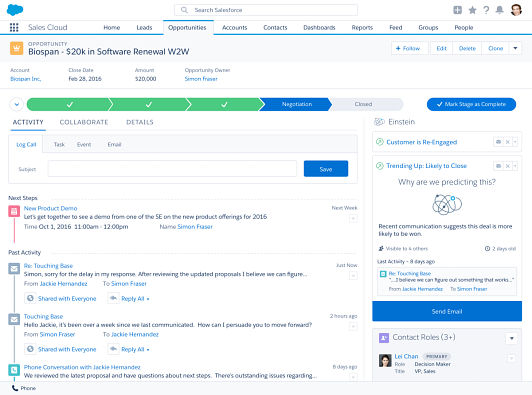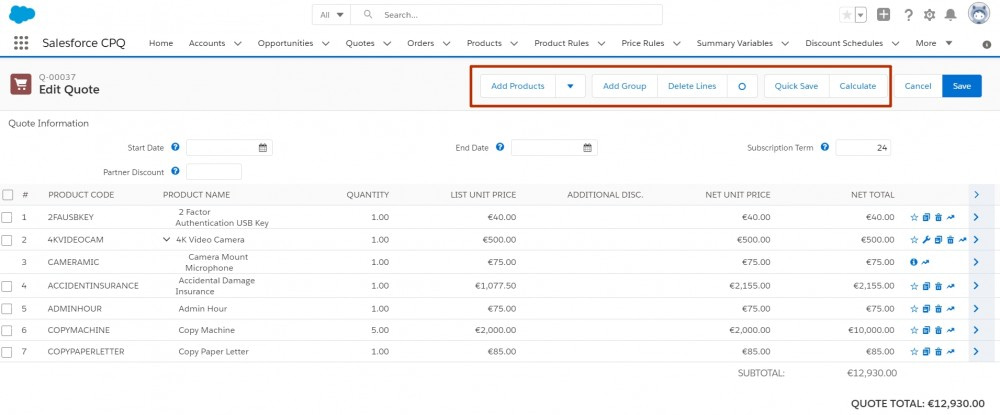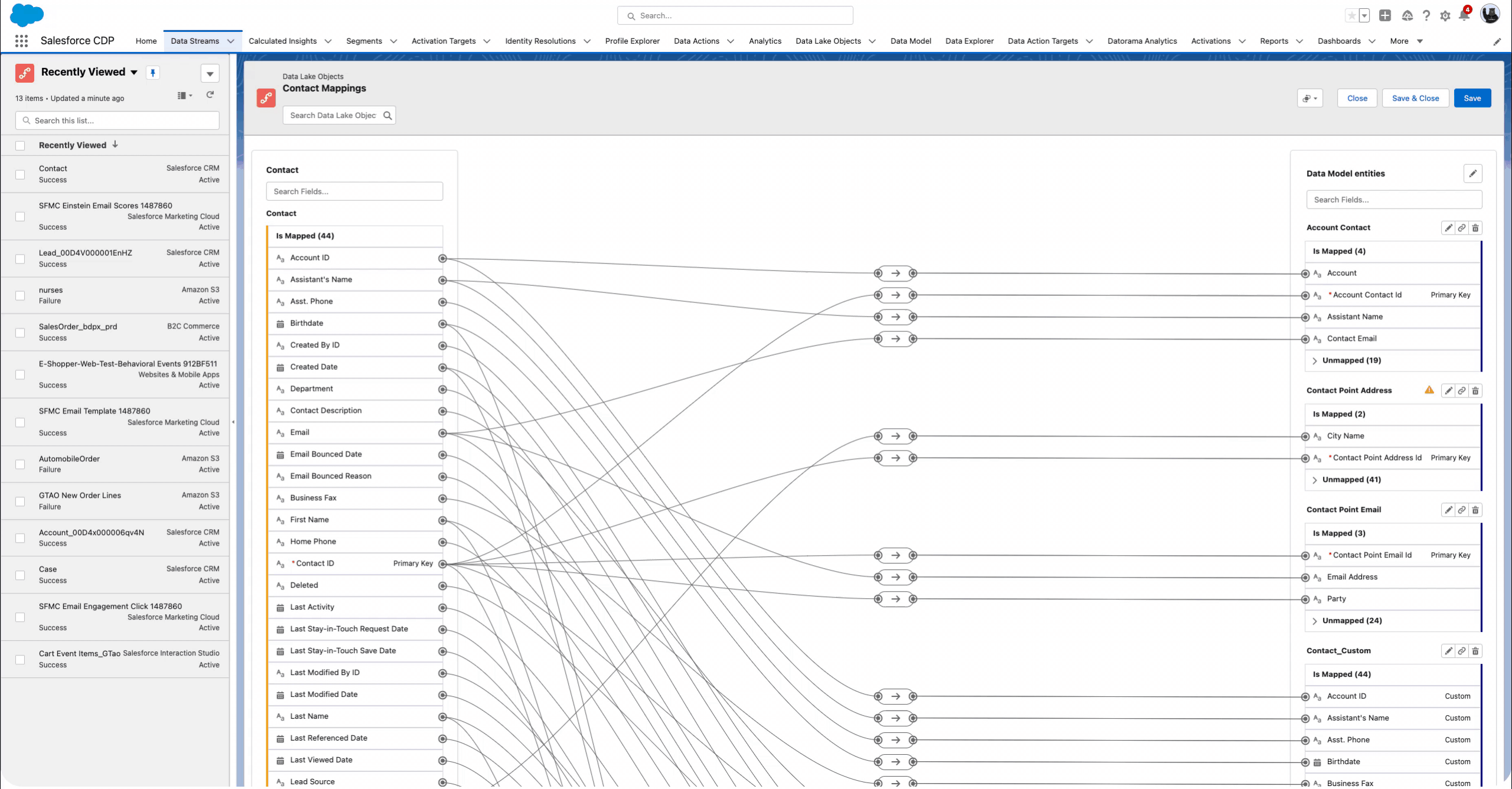Since Salesforce’s launch in 1999, the Salesforce product portfolio has grown exponentially, offering a diverse range of solutions to elevate your business and foster customer connections.
This guide aims to be your comprehensive resource on all things Salesforce. We will dive into the purpose, benefits, and additional features of each product to facilitate your journey through the expansive Salesforce ecosystem.
Salesforce Products Overview
Even for seasoned users, navigating the extensive array of Salesforce products can be overwhelming. Our concise video provides an overview of each product in under 15 minutes, ensuring you grasp the full scope of Salesforce's offerings efficiently.
For a visual takeaway resource tailored for admins and consultants, explore the Salesforce Product Infographic. It offers a clear depiction of the vast Salesforce product landscape and their interconnected functionalities.
Sales Cloud
Sales Cloud stands as Salesforce's premier offering, introduced at the company's inception in 1999, and currently holds the largest market share among all available CRMs.
The primary objective of Sales Cloud is to expedite the sales cycle for companies by equipping them with tools to efficiently manage leads, opportunities, businesses, and individuals with whom they engage. Tailored primarily for B2B enterprises, Sales Cloud incorporates features like quoting, product management, and sales forecasting to benefit sales managers.
Additionally, there are several Add-On Products available for Sales Cloud, including Sales Cloud Einstein, Inbox, Salesforce Maps, Lightning Dialer, Lightning Scheduler, Salesforce Engage, Einstein Sales Analytics, and Revenue Analytics.

CPQ & Billing
Salesforce CPQ, now known as Revenue Cloud, emerged from the acquisition of Steelbrick in 2015. Standing for "Configure, Price, Quote," CPQ goes beyond basic functionality by empowering customers to navigate complex sets of Salesforce products seamlessly.
Salesforce CPQ Features:
Product and Price Rules: CPQ incorporates sophisticated rules for products and pricing. This functionality aids sales users in constructing accurate quotes, accommodating intricate product configurations, and aligning pricing structures with business strategies.
Quote Generation Engine: The quote generation engine automates the process, ensuring efficiency and consistency in creating quotes. This functionality streamlines the workflow, saving time for sales teams and reducing the likelihood of errors.
Billing - An Add-On to CPQ:
Once the quote is finalized, Salesforce Billing takes the reins, orchestrating the subsequent steps in the financial process. This add-on handles invoicing, payment processing, and revenue recognition, offering a comprehensive solution that seamlessly integrates with the CPQ framework.
Key Aspects of Salesforce Billing:
- Invoicing
- Payments
- Revenue Recognition

Service Cloud
Service Cloud by Salesforce is a customer relationship management (CRM) tool designed to support a business's customer service team. It facilitates communication between customers and the company through various channels such as email support, live chat, or phone. Service Cloud then aids customer agents in locating and implementing a resolution to the customer's issue.
Consider your recent interactions with a business, whether through live chat or by creating a support ticket—chances are, the company utilized a system like Service Cloud.
Furthermore, Service Cloud offers several Add-On Products, including Digital Engagement, Service Cloud Einstein, Service Cloud Voice, Customer Lifecycle Analytics, and Salesforce Surveys Response Pack.

Field Service
As a continuation of Service Cloud, Salesforce Field Service offers a holistic perspective on workforce management.
In essence, when a customer requests a new cable service, the cable installer's location, destination, and the quantity of cable in their van are efficiently handled through Field Service Lightning.
Key features encompass appointment scheduling, dispatching technology, territory management, and a mobile app designed to assist field service technicians.

Marketing Cloud
Salesforce Marketing Cloud serves as a digital platform automating marketing activities across various channels, including email, mobile apps, SMS, and websites. Its seamless integration with other Salesforce products, like Sales or Service Cloud, facilitates the free flow of CRM data.
It's important to note that in April 2022, Salesforce updated six Marketing Cloud product names, while the functionality remained unchanged. Familiarizing yourself with these changes can prevent confusion as you delve into the details.
Now, let's explore each individual component of Salesforce Marketing Cloud:
Journey Builder
Tailored for B2C marketing, Journey Builder empowers users to construct dynamic marketing journeys, providing customers with personalized experiences. This tool enables interaction across multiple platforms such as email, mobile, advertising, and websites.

Email Studio
Complementing Journey Builder, Email Studio facilitates the creation of email content for targeted customer communication. With robust features, including customizable elements, scripting languages, and real-time content personalization, Email Studio ensures the crafting of impactful emails.


Mobile Studio
Focused on mobile content creation, Mobile Studio, akin to Email Studio, allows the development of messages delivered through SMS, MMS, and Push messages, enhancing your mobile marketing strategy.
Marketing Cloud Advertising (formerly Advertising Studio)
Bridging beyond email and mobile, Advertising Studio connects with digital advertising platforms like Google, Instagram, LinkedIn, Twitter, and YouTube. Leveraging Journey Builder, this Salesforce product integrates these platforms into comprehensive marketing campaigns.


Marketing Cloud Personalization (formerly Interaction Studio)
Offering advanced personalization, Marketing Cloud Personalization tracks customer behavior on your website to adapt messaging and tailor experiences based on the customer's interests. This component provides a new level of customization for both businesses and clients.
Marketing Cloud Intelligence (formerly Datorama)
Unifying marketing data from various platforms, Marketing Cloud Intelligence acts as a centralized source for reporting, measurement, and optimization. Through out-of-the-box connections, it seamlessly integrates platforms such as Google, YouTube, and Instagram, providing insights into trends, progress against goals, and the ROI of marketing efforts.

Loyalty Management
Introduced by Salesforce in January 2021, aims to assist businesses in effectively engaging and rewarding their customers. Employing a user-friendly interface with clicks instead of code, the platform enables businesses to establish loyalty programs on a large scale. Various programs, such as tiered memberships or points-per-purchase, can be easily created using this system.
Furthermore, Loyalty Management is adaptable to integration with Experience Cloud for customer sign-ups and Marketing Cloud for content distribution.

Marketing Cloud Account Engagement (formerly Pardot)
Formerly known as Pardot, Marketing Cloud Account Engagement is among the widely utilized products within the Salesforce suite, serving as Salesforce's B2B marketing solution. This platform emphasizes email marketing and includes additional features for creating landing pages, generating forms, as well as implementing lead scoring and reporting.
Supplementary products that complement Marketing Cloud Account Engagement include Sales Emails and Alerts (formerly Salesforce Engage), B2B Marketing Analytics Plus, and Engagement History Dashboards.

Slack
In December 2020, Salesforce made its largest acquisition ever by purchasing Slack for $27.7 billion. Slack serves as a business-oriented messaging app, facilitating direct communication with colleagues or interaction through dedicated channels designed for specific purposes, such as project discussions or regional office coordination.
The acquisition of Slack by Salesforce reflects a strategic move to transform business communication in the evolving landscape of remote work. Explore the initial integrations released by Salesforce to seamlessly unite the functionalities of the two platforms.


Experience Cloud
Experience Cloud is the ideal solution for building diverse platforms that enable interaction between your business and customers, partners, or even employees.
On the Salesforce platform, you have the flexibility to construct portals, forums, websites, and help centers seamlessly integrating with all your CRM data. Leveraging a low-code approach, this tool allows you to design visually appealing platforms with ease through intuitive drag-and-drop functionality.
Data Cloud (Salesforce CDP)
Introduced at Dreamforce 2022, Salesforce Data Cloud, formerly known as Salesforce CDP/Genie, is hailed by Salesforce as one of their most groundbreaking innovations to date.
This platform enables the ingestion and storage of real-time data streams on an extensive scale, allowing for the automation of tasks based on this data, ensuring a highly personalized experience.
Data can be sourced from diverse Salesforce data outlets, including Mulesoft and Marketing Cloud, as well as customers' proprietary apps and data sources. The system can then take immediate action on this real-time data, automating processes across various Salesforce components such as CRM, Marketing Cloud, Commerce, and more, including actions through Salesforce Flow.

Analytics Cloud
Given the vast amount of information businesses accumulate, it's imperative for data to be at the core of any strategic approach. Salesforce provides advanced solutions that extend beyond conventional lightning reports and dashboards, offering profound insights into your data.
CRM Analytics
(formerly Tableau CRM)
Native to the Salesforce platform, CRM Analytics empowers users to leverage Salesforce data and external data sources, integrating analytics seamlessly within Salesforce. Access to this data requires Salesforce licenses.

Tableau
Acquired by Salesforce in 2019 to broaden its presence in the business intelligence sector, Tableau remains an external solution more suitable for comprehensive data analysis across the entire business. Users are not obligated to have Salesforce licenses, and there is also an option for Tableau to operate on-premise.

Salesforce Platform (formerly Force.com)
The foundational structure of the Salesforce ecosystem, known as the Salesforce Platform, extends across Sales and Service Clouds, enabling robust customizations to standard Salesforce products. Users can craft custom data tables with personalized objects, initiate automation through Flow, and design tailored user interfaces using the Lightning App Builder.
For a fully customized experience, organizations can opt for Salesforce Platform licenses, which are more cost-effective than, for example, Sales Cloud licenses, allowing the creation of entirely bespoke applications on the Salesforce platform.
Hyperforce
Traditionally, Salesforce hosted its product instances on its servers in a multi-tenanted environment. The introduction of Hyperforce, however, enables users to store their data on public clouds like AWS, Google Cloud, and Azure. Tailored for enterprise companies facing security, compliance, or scaling challenges, Hyperforce provides greater flexibility with public clouds.
Heroku
Functioning as a cloud platform-as-a-service (PaaS) tool, Heroku facilitates the deployment, management, and scaling of modern applications. While the Salesforce Platform caters to internal app development, Heroku is specifically utilized for creating customer-facing applications. Its container-based cloud platform allows seamless integration with Salesforce data through pre-built connectors.
Surveys
Salesforce Surveys & Feedback management simplifies the creation of surveys directly deployable from Salesforce, contingent on specific triggers. The collected data is then captured back into Salesforce for analysis through reports, dashboards, or even Tableau.
Shield
Tailored for companies with heightened security and compliance concerns, Salesforce Shield comprises four products that enhance protection for existing Salesforce products:
- Platform Encryption: Adds an extra layer of AES 256-bit encryption to Salesforce data, with the ability to manage encryption keys.
- Event Monitoring: Provides detailed reports and dashboards to monitor user behavior and track access to sensitive data.
- Field Audit Trail: Extends field history tracking to encompass a more extensive range of fields, storing ten years of historical data, and offers monitoring dashboards.
- Einstein Data Detect: Utilizes AI to identify sensitive data within a Salesforce Org and implements protective measures.

Commerce Cloud
Commerce Cloud enables retailers to swiftly establish an online presence, leveraging the capabilities of Salesforce CMS. With a multitude of out-of-the-box features, this platform caters to both B2C and B2B retailers, empowering them to craft exceptional online experiences for their customers.
Equipped with standard Salesforce features, Commerce Cloud is mobile-ready, seamlessly integrates with Service Cloud and other Salesforce products, and incorporates Einstein AI-enabled functionalities. Notable examples of Commerce Cloud in action can be observed through renowned clients like Puma and Adidas.
Commerce Cloud is available in two distinct variations, tailored to different customer focuses:
B2C Commerce:
Centered on "Business to Consumer," this version operates on a separate technology stack utilizing JavaScript and web technologies. It has undergone multiple architectural iterations, including SiteGenesis, the Storefront Reference Architecture (SFRA), Headless Commerce, and progressive web app development (PWA).
B2B Commerce:
Geared towards "Business to Business," B2B Commerce is seamlessly integrated into the Salesforce platform, aligning with the core multi-tenant architecture of Salesforce.


Order Management
Order Management is designed to complement both B2B and B2C Commerce Cloud within the Salesforce ecosystem. This application is constructed on the core Salesforce platform, facilitating the fulfillment of orders through automated workflows.
Utilizing Salesforce CRM as its foundation, Order Management enables seamless integration with Service Cloud. This integration supports customer requests and returns while leveraging the broader capabilities of the Salesforce Platform to address any specific custom requirements you may have.
Integration (MuleSoft)
The acquisition of MuleSoft in 2018 marked a significant milestone for Salesforce, providing a platform that facilitates seamless connections to various systems through an extensive array of pre-built connectors.
MuleSoft introduces the Anypoint platform, offering centralized management of API connections, execution of integrations, and comprehensive monitoring and reporting – all within a cloud-based system. A standout feature of MuleSoft lies in its extensive collection of existing connectors, enabling integration with Mainframes, ERP systems, and SaaS applications through tried and tested templated solutions.
A recent addition to the Salesforce lineup is Salesforce MuleSoft Composer, a user-friendly and lightweight version of MuleSoft specifically designed for administrators, seamlessly integrated within the Salesforce ecosystem.

Industry Cloud
Over the past few years, Salesforce has dedicated efforts to develop industry-specific solutions, such as Financial Services Cloud, Health Cloud, and the Public Sector Cloud.
These tailored solutions take the core CRM capabilities of Salesforce and transform them into specialized products better suited for specific industries. In the context of Health Cloud, the focus shifts from traditional Accounts and Contacts to more relevant entities like Families and Patients. Similarly, Financial Services Cloud shifts the perspective from Opportunities and Products to concentrate on Financial Holdings and Assets.
The expansion of Salesforce's Industry offerings was further strengthened by the acquisition of Vlocity in 2020. This strategic move broadened the scope to include additional industry-specific clouds, spanning areas like communications, media, and insurance.


Einstein
Functioning as Salesforce's AI layer, Einstein is seamlessly integrated into nearly every Salesforce Cloud. While certain features, like Opportunity Scoring in Salesforce, have become complimentary, the majority of Einstein functionalities are premium add-ons for essential Salesforce products such as Sales, Service, Commerce, and Marketing Cloud.
In March 2023, Salesforce introduced Einstein GPT, a groundbreaking extension to the Einstein product. Utilizing the widely acclaimed ChatGPT platform developed by OpenAI, this innovative AI application is anticipated to be released later this year.
Sales Enablement (myTrailhead)
For those immersed in the Salesforce realm, Trailhead is likely a familiar term – Salesforce's complimentary learning platform offering hands-on technical challenges and essential business skills training.
Expanding on the Trailhead concept, Salesforce introduced Sales Enablement (formerly myTrailhead), a product designed to enable organizations to deploy a customized version of Trailhead internally. This allows the creation of learning modules from the ground up, providing employees with a dedicated space for training, learning, and enhancing skills in various areas.
Additionally, Sales Enablement allows the linkage of milestones to achievements within Salesforce, such as closing deals of specific sizes or generating a predetermined number of Leads.


Quip
Acquired in 2016, the integration of Quip into Salesforce welcomed Bret Taylor, the former co-CEO of Salesforce. Quip combines the functionalities of Slack and Google Docs, offering robust word processing and spreadsheet tools with a strong emphasis on collaboration.
Key features within the platform include Quip Chat, Quip Slides, and seamless integration with Salesforce, enabling the incorporation of live data directly into the documents.
Work.com
Emerging in response to the challenges posed by the Coronavirus Pandemic, Work.com was designed to assist companies and communities in safely resuming operations.
At its core, Work.com revolves around a command center, empowering users to make informed, data-driven decisions regarding various tasks, including the safe reopening of offices. The platform seamlessly integrates with Tableau, facilitating the visualization of extensive datasets.
Beyond the command center, Work.com offers features such as employee health and wellness monitoring, shift management for capacity planning, and contact tracing.


Net Zero Cloud
Among Salesforce's latest offerings, Net Zero Cloud stands out as a carbon-accounting tool designed for companies to assume responsibility for their carbon footprint.
This tool facilitates the upload of data related to business travel, fuel, electricity, gas bills, and supply chain contributions. Equipped with out-of-the-box dashboards, Net Zero Cloud simplifies the identification of significant areas of contribution, trends, and points where proactive measures might be necessary.
Web3
Formerly recognized as NFT Cloud, Web3 signifies Salesforce's formal venture into Web 3.0 technology. The announcement of Web3 took place at Salesforce's event, Connections '22, offering a preview of the upcoming platform.
Through NFT Cloud, users can generate, sell, and oversee their NFTs using the Salesforce platform. This capability allows the creation of digital assets to enhance customer engagement.
The suite of Salesforce products aims to revolutionize your business operations and elevate customer relationships. Hopefully, you now grasp the purpose and advantages of each product, along with an understanding of how they seamlessly interact with one another.

